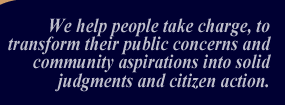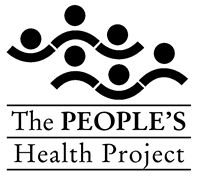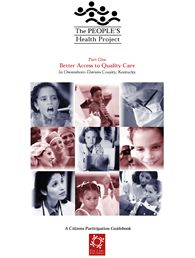

 |
 |

January 2001
 CONTENTS
CONTENTSWhat Is It? How Can I Be Involved?
Citizen Participation Guidebook
Download the Discussion Guide
Download the Feedback Form
(You will need Adobe
Acrobat to view these documents)
What is the People's Health Project?
The People's Health Project is a program of the Public Life Foundation of Owensboro aimed at demonstrating that citizens can influence the direction of health and health care in our community, particularly citizens whose voices often are not heard.
How does the foundation hope to do that?
In several ways: by getting many citizens involved; by better informing them about health care issues; and by sharing their ideas and recommendations with the public at-large and community leaders.
What is the focus of the project?
The project will focus on two priorities that were identified in a recent study conducted by the University of Kentucky: access to health care and healthy lifestyles. Phase one will address access issues.
Who will be involved?
We hope to involve many citizens — as many as possible, from every walk of life.
Our foundation will provide financial and administrative support. We may also use several consultants for training and analyzing results.
Why not let health care professionals deal with health care issues?
We want them to, but we also want health leaders to recognize that citizens have a right to shape the quality of life in their community. Significant tax dollars are applied to health care. Insurance rates, health care costs, the quality of care, and the effectiveness of public health services are concerns we all share.
The People's Health Project reflects the belief that citizens, when properly informed, will make good judgements — and form a constituency that may, in fact, provide important support for health care leaders on future programs and projects.
What will be the role of citizen leaders?
Citizens, representing a cross-section of our community, will be serving on our advisory committee, as forum moderators and recorders.
What will they do?
Committee members will help shape and direct the project, and help us measure public reaction. Moderators and recorders will lead discussions and keep notes at citizen forums.
Will health care organizations be involved?
We will solicit their input, but we hope to design a unique project that provides leadership opportunities for everyday citizens who typically have not been involved in these issues.
What materials will be used?
Pamphlets, discussion guides and feedback forms are being developed for citizen forums. We will also develop several wall charts to guide the discussions.
When will this get underway?
We hope to approve our materials and recruit citizen leaders in early February. We would like to test the materials and format by the end of February, which may lead to some revisions. In March, moderators will be trained and a forum plan will be adopted. We hope to begin citizen forums in April and run them through June.
Where will these forums occur?
Citizen forums will occur at various places around town. We hope to host them in neighborhoods, schools, community centers, and churches — places that are comfortable and convenient for most people.
How many forums will be held?
Our preliminary target is to recruit 20 moderators who will conduct five forums each for a total of 100 forums.
How many people do you hope to reach?
We hope each forum will attract 15-20 people for a total of 1,500-2,000 participating citizens. The media exposure these forums will attract, and the ripple effect of the participants sharing their experiences with family, co-workers, neighbors, and others should enable us to connect with a significant segment of the community.
What will a typical forum be like?
The format is still being developed, but we want to have plenty of time for participants to discuss the issues. Following an introduction and an overview of health access issues, the group will break up into groups of six-to-seven citizens to discuss the issues and complete a Feedback Form. A typical forum would begin at 6:30 p.m. and conclude around 9:00 p.m.
Where will committee meetings be held?
That is to be determined.
How often will they meet?
The committee will determine that also. We estimate that the project will occur over a ten-month period. There will also be events, such as news conferences, in which committee members will be invited.
Will committee members be expected to attend forums in addition to attending meetings?
No, but they are welcome to attend (or even participate).
Will forum participants be paid? Will committee members be paid?
With the large number of people who ultimately will be involved, it is not practical to compensate everyone. Most people do not wish to be paid, but consider this a community service. Because of the time involved in preparing for and conducting forums, moderators will be offered a modest stipend. If requested, we will reimburse committee members and forum participants for expenses (e.g., child care, transportation, etc.) incurred due to participation in the People's Health Project.
Are committee members also expected to be moderators?
No, but they are not excluded from being considered if interested.
What do we hope will ultimately come from the People's Health Project?
We hope the citizens who get involved will make their own decisions. But this project could lead to the formation of a permanent, ongoing community health advocacy group. It could be that elected officials and leaders in health care will find new or better ways to address the concerns of everyday citizens. Perhaps in the future, before major health care projects or policies are authorized, stronger public participation will be built into the decision-making process.
The people of Owensboro and Daviess County are concerned about health care. Many worry about having the insurance coverage they need, or getting medical care if they cannot afford insurance. They see skyrocketing charges for prescription drugs, hospital stays, and surgeries. They know they should see a doctor and exercise regularly, but for various reasons, they don't or may be unable to.
From a recent University of Kentucky research project (funded by our foundation and more than 20 other organizations), we have a better understanding of health and health care in our community and a keener sense of key community health issues.
How can our community address these challenges? Can our major health care providers
work together more effectively? What can citizens do to improve health care
in Owensboro and Daviess County?
Through “The People’s Health Project” forums and exercises:
We value your perspective and welcome your participation. These are tough problems.
Examine the facts, share your stories, and consider the kind of community we
want to be.
The results of these exercises will be summarized and shared with elected officials,
health care organizations, and the public at large.
Your participation does make a difference! Thank you.
Many people do not have a regular doctor who knows their medical history. They
seldom have check-ups. They wait until a condition is serious and seek treatment
at the hospital emergency room, clinic, or urgent care center. Once they are
stabilized there is often no follow-up, or they may receive a small supply of
a medication that does not last long.
This is not the best kind of care. It also costs more, and the public absorbs
most of that cost. Therefore, it is in everyone's best interest to increase
the number of people with a medical home, and to increase the number of people
who receive preventive care.
How can we, as a community, help make that happen?
|
Recent Findings
|
13,000 (22%) Daviess County adults do not have a primary care provider.1 The Owensboro Mercy Health System Emergency Room is the busiest in the state, serving 58,000 in 2000.2 |
" We see huge gaps in the system. We get calls every single day from people who need medications, diabetes testing, or treatment following screenings. They are not eligible for Medicaid, or Medicaid doesn't cover a certain need they have. We can't get them in to see doctors. Our clinic physician travels to seven counties. We have nowhere to send these people."
- Social Worker, Green River District Health Department
People fall through the cracks of our current health care system. People lose health insurance benefits when they change jobs. It may take several weeks to qualify for a program when a condition needs to be treated immediately. Many people do not have insurance for dental care, mental health services and preventive care. The language barrier is a growing problem in meeting Hispanic community needs.
What can our community do to help?
|
Recent Findings
|
More than 4,800 Daviess County adults had no health insurance last year.1 570 families with children who are eligible for K-CHIP (state insurance program) have not signed up.1 Women who work part time are most likely to be uninsured.1 87% of doctors say they have had patients who were denied coverage for health services by a health plan in the last two years.3 The rate of uninsured people is more than 20% higher in rural areas
than in urban areas.4 |
Compared with the rest of Kentucky, we have a shortage of primary care physicians
in Daviess County. Many poor people (and many social workers who help them)
complain about the difficulty of getting in to see doctors.
However, some doctors advertise for new patients regularly. Are they advertising
for certain types of patients only — as in fully insured, paying patients?
Perhaps many people who are looking for a new doctor do not read the newspaper.
How can our community attract more doctors or, at least, better connect people to the doctors, clinics, and hospitals we already have?
|
Recent Findings
|
In Daviess County, we have 46.7 primary care physicians per 100,000 population; the statewide rate is 78 per 100,000.1 60 local health professionals and 14 pharmacies participate in a statewide program that provides free non-emergency care for the poor who do not qualify for other programs.5 |
Instead of more doctors, some say we should emphasize a health system that
treats all people fairly. Some doctors care for everyone; others do not accept
Medicaid or uninsured patients. Some office workers are courteous and helpful;
others can be impatient and rude to people who need special assistance. Some
patients can be unfair and rude to staff as well.
Some people have a harder time getting appointments, wait longer in lobbies,
and feel others receive preferential treatment. On the other hand, many people
do not show up when they have appointments.
Does this reflect the values of our community? What can we do to improve care and consideration of all?
|
Recent Findings
|
Better educated, higher income people are also healthier.1 |
Many people live in areas that are not near health care facilities. Families
juggle several jobs, overlapping shifts, and child care. They seldom have time
during regular business hours to see a doctor. Transportation may be a problem.
Their jobs may not provide flexible hours or compensation when they are sick.
Many people simply don’t understand the system — the paperwork, the
approval process. They are intimidated by large hospitals, insurance forms,
and voice mail directories. They are tired of being sent from one office to
another.
Should we, as a community, find ways to take health care to these people?
|
Recent Findings
|
Nationwide, 33% of workers hold hold more than one job.6 More than 3,000 (10%) Daviess County housing units are without a vehicle, 8% of households do not have a telephone.7 More than 4,000 (6%) Daviess Countians have transportation problems
or require care in their homes.7 |
Many employers do not provide health insurance for their workers and families.
Others pay only a portion of employee health insurance costs. And many people,
although insured, cannot afford the deductibles due before coverage kicks in.
As a result, many people in our community do not have or use their health insurance
coverage. They cannot afford the cost of doctor’s office calls, medications,
and surgeries. They do not see a doctor even when they know they should. The
cost of care is beyond their ability to pay.
Only one health insurance carrier has a strong presence in our community. One
hospital serves our community. Some say this eliminates duplication, while others
say this does not foster the competition that keeps costs down.
How can our community keep health care costs as low as possible?
|
Recent Findings
|
Nearly 13,000 (21%) of Daviess County adults (or someone in their family) needed to see a doctor last year but did not because of costs.1 Nearly 8,000 (13%) of Daviess County adults have not seen a dentist
in more than five years.1 |
Prescription drugs help more people than ever, including many people with serious ongoing problems. Unfortunately, costs continue to soar.
Nearly 80% of people covered by Medicare use prescription drugs regularly, but Medicare generally does not pay for medications when patients leave the hospital.6
"I have clients who take their medication every other day, or once every three days, because they can't afford the full dosage."
- Social Worker, Green River District Health Department
While state and national governments debate various prescription drug benefit options, is there anything our community can do?
|
Recent Findings
|
Because of costs, nearly 11,000 (18%) Daviess County adults did not
fill a prescription last year.1 In 1998, the cost of the 50 most prescribed drugs used by seniors increased four times faster than the rate of inflation.3 |
Harold Baggett, David Bell, Jay Burns, Bruce Chisholm, Chuck Conkright, Diane
Coomes, Don Crask, Janet Dillehay, Jerry Dockery, Sue Jarvis, Steve Kulka, Rosemary
Lawson, Robyn Mattingly, Steve McFarland, Orlander Mitchell, Mark Mosley, Bill
Moss, Elizabeth Pendley, Ethan Price, Patti Rayburn, Mary Shacklett, Dan Spalding,
Roy Stone, Elnor Thielen, Trish Todd, Gayle Welsh, Sister Fran Wilhelm, Percy
Wilkerson and Estell Young
Advisory Committee includes a carpenter, clerk, cook, factory worker, teacher,
truck driver, fireman, construction worker, small business owner, social worker,
salesman, several retirees and others.
Ken Adkisson, Marcy Allman, Nelda Barnett, Marc Bosley, Kathy Byrd, Jerry Coomes,
Vivian Craig, Debby Crone, Bob Darling, Susan Davis, Marianne Smith Edge, Ralph
Kunze, Ron Mayhew, Lisa Mingus, Kathy Olson, Sister Rose Jean Powers, Maggie
Price, Debbie Reynolds, Dale Taylor, Lisa Townsend